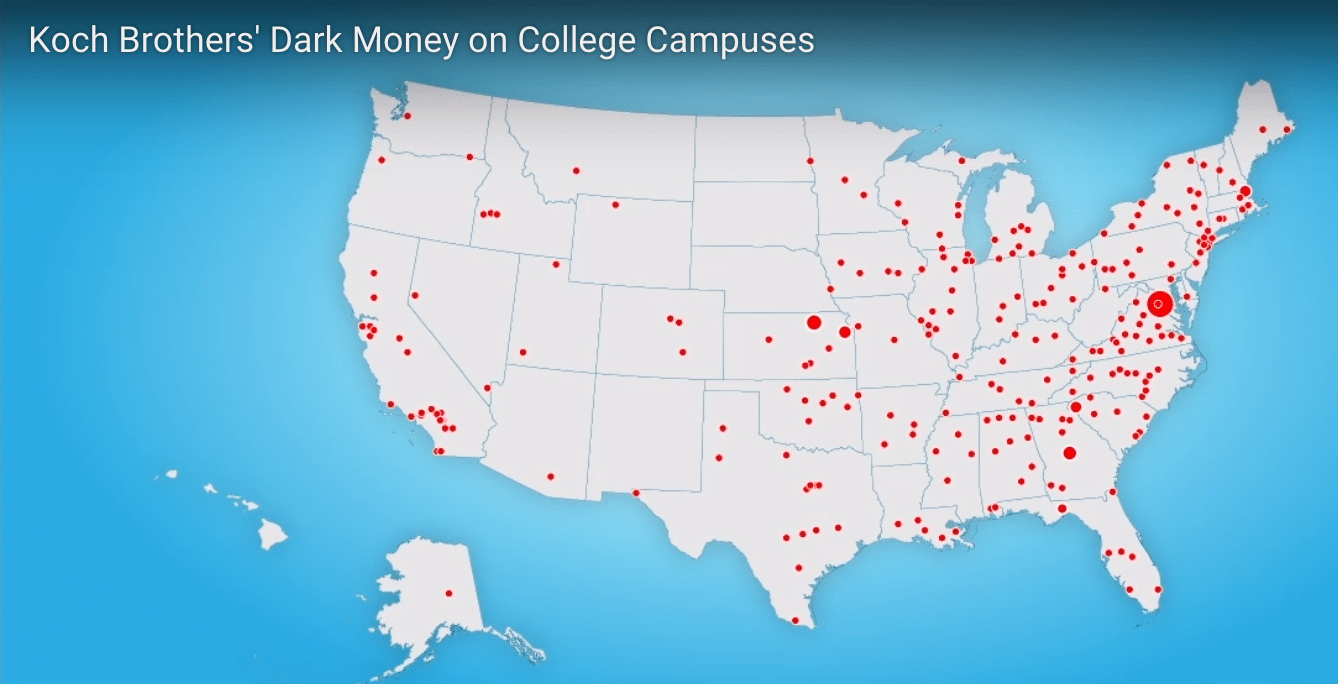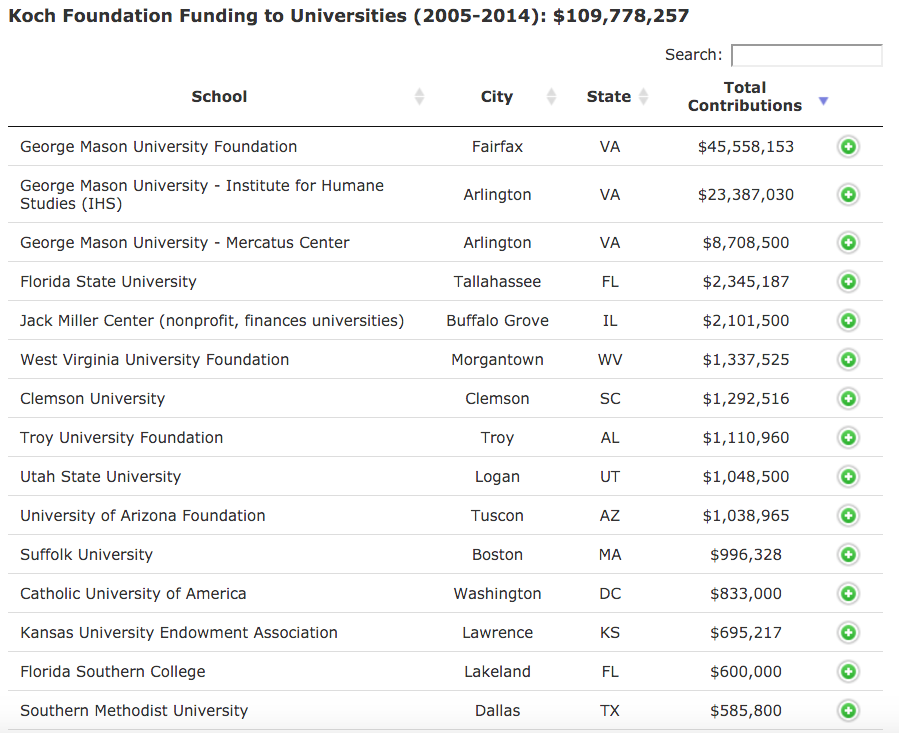This is a guest post by Connor Gibson that originally appeared at Huffington Post.
This article is the second of two posts examining Charles Koch’s campus investments, as reported in Jane Mayer’s Dark Money. The first post examined the history, long-term strategy, and true intent of the university “philanthropy” coordinated by Charles Koch. This post examines how Koch’s academic network is openly dishonest about their work, lobbying for Koch’s interests and recruiting students into his network.
From 2005-2014, Koch spent $109.7 million on 361 distinct campuses, according to Greenpeace’s updated analysis of IRS filings from Koch’s nonprofit foundations.
KOCH–FUNDED DECEPTION
Using examples spanning from the 1960s to 2014, Jane Mayer shows that Koch-funded operatives and professors know they are in the business of deceiving others. Presenting to a conference of Koch donors in June, 2014, a Koch-funded professor describes how he tricks his progressive colleagues into supporting a Koch-funded indoctrination campaign on human “well-being:”
[A] speaker explained to the donors just how deliberate and politically disarming the term was. James Otteson, a conservative professor of political economy at Wake Forest University, called it “a game changer.” In fact, he told the donor group that he was planning to build a “well-being” center at Wake Forest, where he already was executive director of the BB&T Center for the Study of Capitalism.
One anecdote, he said, illustrated “the power of framing” free-market theories as a movement to promote well-being. He recounted that a colleague, whom he described as a prominent “left wing political scientist” who “rails” against Republicans and capitalism, had been so entranced by the idea of studying the factors contributing to human well-being that he had said, “You know, I’d even be willing to take Koch money for that.” Upon hearing this, the donors laughed out loud. “Who can be against well-being? The framing is absolutely critical,” Otteson exclaimed. [p. 363]
This was not a unique instance in Mayer’s research. One of Charles Koch’s closest advisors was even more explicit as early as 1976:
[Koch advisor George Pearson] suggested that libertarians needed to mobilize youthful cadres by influencing academia in new ways. Traditional gifts to universities, he warned, didn’t guarantee enough ideological control. Instead, he advocated funding private institutes within prestigious universities, where influence over hiring decisions and other forms of control could be exerted by donors while hiding the radicalism of their aims.
As [former George Mason University professor Clayton] Coppin summarized Pearson’s arguments, “It would be necessary to use ambiguous and misleading names, obscure the true agenda, and conceal the means of control. This is the method that Charles Koch would soon practice in his charitable giving, and later in his political actions.” [p. 56]
Another key figure in wrangling money from Olin, Koch and others for campus indoctrination was even more frank. Mayer quotes James Piereson of the William E. Simon Foundation and the Manhattan Institute:
The key, Piereson explained, was to fund the conservative intelligentsia in such a way that it would not “raise questions about academic integrity.” Instead of trying to earmark a chair or dictate a faculty appointment, both of which he noted were bound to “generate fierce controversy,” he suggested that conservative donors look for like- minded faculty members whose influence could be enlarged by outside funding. […] To overtly acknowledge “pre-ordained conclusions” would doom a program. Instead of saying the program was designed to “demonstrate the falsity of Marxism” or to promote “free- enterprise,” he advised that it was better to “define programs in terms of fields of study, [like the] John M. Olin Fellowships in Military History.” He wrote, “Often a program can be given a philosophical or principled identity by giving it the name of an important historical figure, such as the James Madison Program [in] American Ideals and Institutions at Princeton University.” [pp.103-104]
Mayer illustrates this deceptive birth of corporate-funded academics using the field of “Law and Economics,” an entire discipline that was created with funds from John M. Olin. The field continues to be financed by Koch, and was one of the trojan horse programs that James Piereson candidly describes:
“Piereson, however, admitted that the beauty of the program was that it was a stealth political attack and that the country’s best law schools didn’t grasp this and therefore didn’t block the ideological punch it packed. ‘I saw it as a way into the law schools–I probably shouldn’t confess that,’ he told The New York Times in 2005. ‘Economic analysis tends to have conservatizing effects.’ […]
“’If you said to a dean that you wanted to fund conservative constitutional law, he would reject the idea out of hand. But if you said you wanted to support Law and Economics, he would be much more open to the idea,’ he confided. ‘Law and Economics is neutral, but it has a philosophical thrust in the direction of free markets and limited government. That is, like many disciplines, it seems neutral, but it isn’t in fact.’” [p. 108]
Koch uses Piereson’s exact model today, financing neutral-sounded operations on dozens of campuses receiving six, seven and eight-figure donations from Koch and its donors partners. Recent examples include:
- Arizona State University‘s $5 million Center for the Study of Economic Liberty, co-financed with the W.P. Carey Foundation.
- University of Arizona‘s $2.5 million Center for the Philosophy of Freedom, co-financed by Ken and Randy Kendricks and Karl Eller.
- University of Kentucky’s $12 million Institute for the Study of Free Enterprise, co-financed with Papa Johns CEO John Schnatter.
- University of Louisville‘s $6 million Center for Free Enterprise, co-financed with Papa Johns CEO John Schnatter in Kentucky.
- University of Maryland at College Park‘s $6 million Center for Enterprise and Markets, co-financed with Philadelphia Flyers owner Ed Snider.
- Creighton University‘s $4.5 million Institute for Economic Inquiry, co-financed with Gail Werner-Robertson in Nebraska.
- West Virginia University‘s $5 million Center for Free Enterprise, co-financed by Ken Kendricks
KOCH‘S PET PROFESSORS
As suggested by Piereson, Koch officers use relationships with individual professors to get the Koch-funded operations started. At the 2015 “Western Civilization Summit” at the Koch-funded Texas Public Policy Foundation (TPPF), the Charles Koch Foundation’s director of higher education policy said:
“I think what’s important is to–when a university is coming to solicit, or when you’re having those conversations with a university, as I was suggesting earlier–to push really deep on what the programs they have in place that do talk about these kinds of ideas. Or, is there even one professor who does that. And then, talk with that person, with that professor, and learn more about what they’re doing so don’t allow the university to just paint in broad strokes ‘we’re all about diversity, we’re all about this, we’re all about that.’ [Footage at 0:53:10]
STUDENT INDOCTRINATION
Koch-funded operatives have admitted the unpopularity of their manipulation in college classrooms, urging the need to sell their unpopular ideas with soft language. Koch’s tactic of selling used cars–in this case, an ideology of virtue in an unregulated, belligerent pursuit of personal wealth–has been tested and refined for decades.
Mayer looks at Brown University as an example of Koch’s long-term investments in action:
At Brown, which is often thought of as the most liberal of the Ivy schools, Charles Koch’s foundation gave $147,154 in 2009 to the Political Theory Project, a freshman seminar in free-market classics taught by a libertarian, Professor John Tomasi. “After a whole semester of Hayek, it’s hard to shake them off that perspective over the next four years,” Tomasi confided “slyly,” according to a conservative publication. Charles Koch’s foundation gave additional funds to Brown to support faculty research and postdoctoral candidates in such topics as why bank deregulation is good for the poor. [p.155]
KOCH‘S STUDENT–TO–ELECTION “TALENT PIPELINE”
In the process of influencing the thinking of “millions” of students, Koch officers have boasted to other political donors about their university “talent pipeline” for training future lobbyists. As Koch lobbyists explained to the Koch donor network, the Charles Koch Foundation and Institute for Humane Studies pull students into paid internships at Koch-funded advocacy groups, teaching them Koch’s preferences along the way.
Mayer cites a recording obtained by The Undercurrent’s Lauren Windsor, as publishedby the Center for Public Integrity:
“At the June summit, [Charles Koch Foundation executive Ryan] Stowers stressed to the donors that this ‘investment’ in education had created a valuable ‘talent pipeline.’ Assuming the thousands of scholars on average taught hundreds of students per year, he said, they could influence the thinking of millions of young Americans annually. ‘This cycle constantly repeats itself,’ he noted, ‘and you can see the multiplier effect it’s had on our network since 2008.’
“In summation, [Kevin] Gentry stressed to the donors, ‘So you can see, higher education is not just limited to an impact on higher education.’ The students were ‘the next generation of the freedom movement,’ he said. ‘The students that graduate out of these higher-education programs populate the state-based think tanks and the national think tanks.’ And, he said, they ‘become the major staffing for the state chapters’ of the ‘grassroots’ groups. Those with passion were encouraged to become part of what he called the Kochs’ ‘fully integrated network.’ At this point, he paused and said, ‘I got to be careful how I say this.’ He paused again. ‘They populate our program.’” [pp. 365-366]
Mayer notes that this may be a violation of IRS tax law for Koch-controlled “charities” involved:
“The reason Gentry had to be careful was that the Kochs described their educational activities to the IRS as nonpolitical charitable work, qualifying them for tax breaks and anonymity. Yet what Gentry was describing could scarcely be more political. It was a full-service political factory. As he addressed the donors, cajoling them to ‘invest’ more, he couldn’t resist adding further detail. ‘It’s not just work at the universities with the students,’ he went on. ‘It’s building the state- based capabilities, and election capabilities, and integrating this talent pipeline. So you can see how this is useful to each other over time. No one else has this infrastructure. We’re very excited about doing it!’” [p.366]
ACADEMIC STEALTH LOBBYING
At times, Koch-funded professors have played overtly political roles, engaging directly in lobbying on issues that affect Koch Industries’ business.
At West Virginia University, the Charles Koch Foundation’s donation of $965,000 to create the Center for Free Enterprise came with some strings attached. The foundation required the school to give it a say over the professors it funded, in violation of traditional standards of academic independence. The Kochs’ investment had an outsized impact in the small, poor state where coal, in which the Kochs had a financial interest, ruled. One of the WVU professors approved for funding, Russell Sobel, edited a 2007 book called Unleashing Capitalism: Why Prosperity Stops at the West Virginia Border and How to Fix It, arguing that mine safety and clean water regulations only hurt workers. “Are workers really better off being safer but making less income?” it asked. Soon, Sobel was briefing West Virginia’s governor and cabinet, as well as a joint session of the Senate and the House Finance Committees. The state Republican Party chairman declared Sobel’s antiregulatory book the blueprint for its party platform. [pp.154-155]
These lobbyist-professors continue to teach classes, affecting the ways that students are taught to prioritize information:
Students complained that the Koch influence was nefarious and omnipresent. Jerry Funt, an undergraduate, said that in the public university’s introductory economics course, “We learned that Keynes was bad, the free-market was better, that sweatshop labor wasn’t so bad, and that the hands-off regulations in China were better than those in the U.S.” Their economics textbook, he said, was co-written by Russell Sobel, the former recipient of Koch funding at West Virginia University who had taught that safety regulations hurt coal miners. The textbook, which Funt described as arguing that “climate change wasn’t caused by humans and isn’t a big issue,” had been given an F by an environmental group. But when critics raised objections, the Kochs defended their purchase of influence over public universities as merely providing “fresh” college thinking. [p. 365]
Academics, reporters and activists have gone to great lengths to document more instances of Koch’s use of campuses for political lobbying. Ms. Mayer dug up more examples, which are sure to be of interest to the academic community.
The Mercatus Center at George Mason University lobbied for the infamous Enron loophole deregulation scheme, after hiring Enron executive Wendy Gramm [pp.154-155]. Mercatus also leveraged attacks on President Obama’s stimulus package, the plan to spend the economy out of recession [p.171].
SUPPLANTING PEER–REVIEW
Koch and its predecessors like Olin and Bradley have discovered how out of touch most Americans are with the (ideally) rigorous academic process of peer-review. While professors and other academics are familiar with assessing the validity of varying publishing bodies, the public and the media they rely upon often do not require exhaustive vetting of information before accepting it. This has allowed Koch-funded professors to publish reports–incapable of passing a true peer-review–using universities names in order to bolster the credibility of their advocacy.
Without the rigorous peer-reviewed standards required by prestigious academic publications, the Olin Foundation was able to inject into the mainstream a number of works whose scholarship was debatable at best.
This has been illustrated as recently as 2015, with Koch-funded professors at Utah State University advocating against subsidies for competitors to Koch Industries: wind and solar companies.
Professors at the Koch-funded Institute for Political Economy at USU, and its off-campus, Koch-funded affiliate organization, Strata Policy, have written dishonest op-eds and testified in other states’ legislatures to support Koch-backed campaigns against clean energy subsidies. Previously, professors at Kansas University and Suffolk University were financed by Koch to advocate for removal of clean energy subsidies, via reports that were not published in academic, peer-reviewed journals.
(Suffolk has since committed kick its Koch-funded think tank off-campus by the end of 2016).
Koch’s use of professors for lobbying isn’t restricted to energy issues, nor state-level politics. George Mason University’s Mercatus Center has been cited repeatedly in the Congressional record, as reported by the Center for Public Integrity:
Congress is also paying more attention to the Mercatus Center, which from 1999 to 2008 was mentioned by name 32 times in either the Congressional Record or congressional committee reports. Since 2009, it’s been mentioned 93 times, often in reference to Mercatus Center faculty who were testifying before Congress.
This year, Congress even cited Mercatus Center research in the text of budget bills. House Concurrent Resolution 27 and Senate Concurrent Resolution 11 note that a Mercatus Center study “estimates that Obamacare will reduce employment by up to 3 percent, or about 4 million full-time equivalent workers.”
In North Carolina, the Mercatus Center published a report cited by Koch’s flagship lobbying group, Americans for Prosperity, in a push against healthcare expansion.
In Arizona, a Koch-funded campus center has advanced the priorities of Governor Doug Ducey. The Koch-funded Center for the Study of Economic Liberty at Arizona State University appears to have laid the groundwork for Governor Ducey’s plan to raid his state’s education trust and prematurely spend $2 billion in savings. Ducey, a regular attendee of the Koch brothers Freedom Partners political summits, has ignored the warnings of defunded future education from Arizona’s state treasurer.
PERPETUAL VULNERABILITY
The opportunity to leverage large grants to university programs and endowments is no secret in the Koch network. One of Koch’s partner donors, billionaire Home Depot founder Ken Langone, expressed his frustration frankly after a public finance scandal: “if it wasn’t for us fat cats and the endowments we fund, every university in the country would be fucked.” [p.14]
The question for professors, students and university administrators is what hoops they will have to jump through as a result of selling endowments and campus operations to private donors.
Image credit: UnKochMyCampus.org
Subscribe to our newsletter
Stay up to date with DeSmog news and alerts








